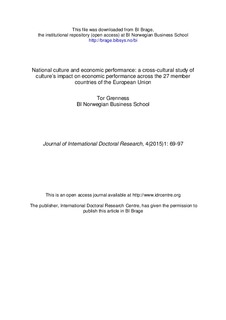| dc.contributor.author | Grenness, Tor | |
| dc.date.accessioned | 2016-01-29T08:19:13Z | |
| dc.date.available | 2016-01-29T08:19:13Z | |
| dc.date.issued | 2015 | |
| dc.identifier.citation | Journal of International Doctoral Research, 4(2015)1: 69-97 | nb_NO |
| dc.identifier.issn | 2328-0832 | |
| dc.identifier.uri | http://hdl.handle.net/11250/2375203 | |
| dc.description | This is an open access journal available from http://www.idrcentre.org | nb_NO |
| dc.description.abstract | This paper examines the impact of national culture on variations in economic performance among the European Union countries. In order to explain differences in economic performance we have used two data sets: The scores of the EU countries on Hofstede’s five cultural dimensions, and the scores on economic performance from The Global Competitiveness Report (GCR) presented by The World Economic Forum. What we found was that countries with high scores on Power Distance and Uncertainty Avoidance score low on economic performance, while high scores on Individualism have a positive effect on economic performance. Although a multiple regression analysis did not reveal valid results about which dimension that consistently explains variations in economic performance, the overall explained variation of the model is high enough to support the conclusion that national culture contributes to explain variations in economic performance across the European Union countries. | nb_NO |
| dc.language.iso | eng | nb_NO |
| dc.publisher | International Doctoral Reseach Centre | nb_NO |
| dc.title | National culture and economic performance: a cross-cultural study of culture’s impact on economic performance across the 27 member countries of the European Union | nb_NO |
| dc.type | Journal article | nb_NO |
| dc.type | Peer reviewed | nb_NO |
| dc.source.journal | Journal of International Doctoral Research | nb_NO |
| dc.description.localcode | 1, OA | nb_NO |
